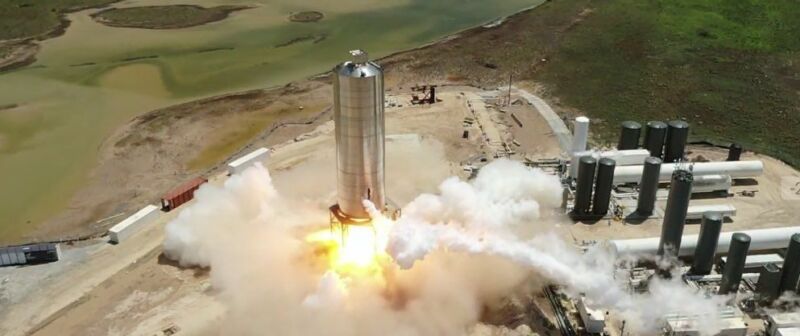
After scrubbing several attempts for weather concerns, technical issues, and even a range violation due to a nearby boat, SpaceX succeeded in static-fire testing the latest prototype of its Starship vehicle on Thursday.
At 3:02pm local time in South Texas, the single Raptor engine attached to the Starship prototype dubbed Serial Number 5, or SN5, roared to life for a few seconds. In video shared by NASASpaceflight.com, the test appeared to be nominal, evidently providing SpaceX engineers with the confidence they need in the latest iteration of Starship.
Starship SN5 just completed full duration static fire. 150m hop soon.
— Elon Musk (@elonmusk) July 30, 2020
Shortly after the test, the founder and chief engineer of SpaceX, Elon Musk, confirmed that the static fire meant the company now plans to move forward with a short test flight of the vehicle. Based upon a notification from the US Federal Aviation Administration, this 150-meter flight test could take place as soon as Sunday, with a launch window opening at 8am local time (13:00 UTC).
This would be the first flight test of Starship hardware since a stubby prototype—Starhopper—soared to 150 meters in late August 2019. That test, in which a single Raptor engine powered the vehicle upward and laterally for about 100 meters before landing, was successful in demonstrating thrust and vector control of the methane-fueled engine.
Since then, SpaceX has built several full-scale prototypes, losing them to a varying array of fueling and pressure tests. With an iterative test program like the one SpaceX is using to develop Starship, the company has chosen to accept some reasonable level of risk in order to move fast.
And SpaceX has been doing just that. Over the last eight months, it has built an impressive factory in South Texas and has begun to churn out Starship prototypes. Its engineers and technicians have reduced the time to build a single Starship down from months to weeks, bringing the company closer to Musk's ultimate goal of mass-producing the large, interplanetary spaceships that may one day allow humans to settle Mars.
Even as SpaceX has been putting SN5 through its paces on the test stand, there are bits of hardware at the site for several future prototypes, including models that will use a new, tougher steel alloy. Ultimately, SpaceX plans to hop one of these latter prototypes to about 20km, perhaps later this year.
After that point, the company is expected to focus on completing the launch system's first stage, a rocket named "Super Heavy" that will be used to loft Starship into low Earth orbit.
Technology - Latest - Google News
July 31, 2020 at 05:03AM
https://ift.tt/2D3YJFJ
SpaceX completes static fire of Starship prototype, will hop next - Ars Technica
Technology - Latest - Google News
https://ift.tt/2AaD5dD
Bagikan Berita Ini














0 Response to "SpaceX completes static fire of Starship prototype, will hop next - Ars Technica"
Post a Comment